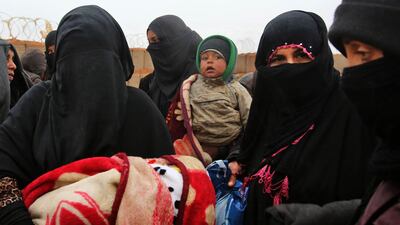Forces loyal to the Syrian regime clashed with a United States-backed group on the outskirts of Rukban camp late on Wednesday as the United Nations attempted to distribute aid to thousands of starving civilians.
Developments around Rukban are closely watched because it lies with a 55-kilometre deconflict zone that was set up by the US to shield the nearby garrison town of Al Tanf, where their forces are based.
"The clashes lasted for two hours after forces backed by the regime entered the de-escalation zone and attacked members of Maghawir Al Thawra in an attempt to destruct and destabilise security in the area," Col Muhanad Al Talaa, commander of the group, also known as the Revolutionary Commando Army, told The National.
The group is a faction of the Free Syrian Army that operates in the camp, which sits along the Syrian-Jordanian border.
No casualties were reported.
Shurki Shehab, spokesperson for the committee representing residents of the camp, said clashes between the two sides is not a new phenomenon.
“It usually happens between the two parties, especially when regime forces attempt to advance inside the deconflict zone, but they are usually stopped by forces of the Maghawir Al Thawra,” Mr Shehab said.
The development comes as the UN completed its second delivery of much-needed humanitarian assistance this year to the 15,000 internally displaced Syrians stranded inside the camp.
The Syrian Arab Red Crescent also took part in the operation.
“The delivery of assistance started on 6 September and lasted until Wednesday afternoon. The UN/Sarc convoy consisted of 22 trucks, carrying food rations and 50 kilogram sacks of wheat, as well as high-energy biscuits,“ said a statement by the UN.
The distribution was the second phase of an extensive operation aimed at easing the suffering of civilians, the statement said, adding that the upcoming third phase is to support the departures of families who wish to leave voluntarily to government held areas.
The camp previously housed around 40,000 people displaced by fighting in Syria's civil war, but numbers have dropped sharply with rising levels of hunger and poverty in the camp.
“We are hungry, starving, our children have no milk, no diapers or medication, our situation is getting worse and worse every day,” said Iman Al Kheir, a camp resident.
“We are grateful for the help of the UN and Sarc but we need it to be consistent, otherwise we will all die,” she said.
This is the third time the UN and Sarc have provided humanitarian assistance to Rukban – the first delivery was in November 2018 and the second in February 2019.
The UN has frequently said that conditions inside the camp remain dire and relief workers have limited access or means to provide basic supplies and services.
“Our main objective during the distribution of aid was to provide life-saving humanitarian assistance to the people of Rukban. Half of them are children who have suffered an indescribable hardship,” Corinne Fleischer, the UN Resident and Humanitarian Co-ordinator in Syria, said.
The camp has been under a blockade imposed by the Syrian government and its ally Russia, who say Rukban is being used as shelter by militant groups.
The UN says that the number of people leaving Rukban on their own has slowed over the past few months since many of those that wish to leave can’t afford the transport, while others fear for their safety if they were to leave the camp.
The UN and Sarc have both pledged to assist those voluntarily wishing to leave the camp in line with humanitarian principles.
But rights groups have warned that civilians returning to government held territory face detention and conscription. However, conditions in the camp are so dire that many residents only eat one meal a day.


